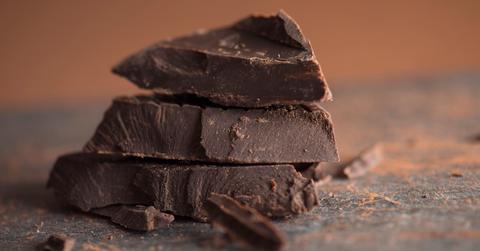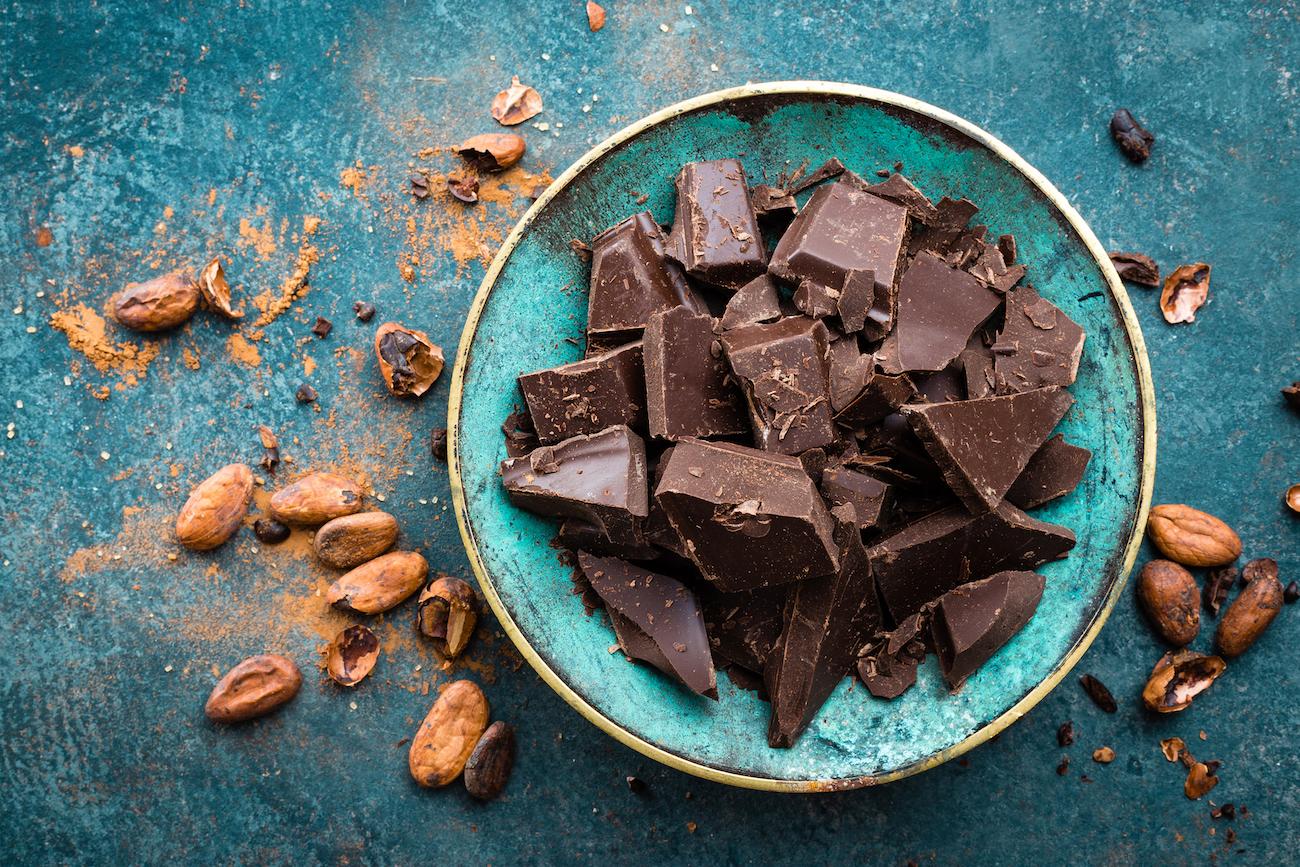Health Benefits of Dark Chocolate — Yes, Chocolate Can Be Good for You
The darker the better.
Updated Oct. 15 2019, 12:51 p.m. ET

Whenever an article floats around the Internet touting research that a “junk” food — whether it’s bacon or cheese or wine — is actually healthy, people go wild with excitement, regardless of the source or details. Unfortunately, those articles tend to be based on studies that do not include enough unbiased scientific evidence. But, since chocolate comes from a plant, you may be wondering if the rumored health benefits to one of nature’s yummiest desserts are actually true. Does dark chocolate actually have any health benefits?
Does Dark Chocolate Have Health Benefits?
Good news for chocoholics! There are a slew of health benefits and nutrients you can get from eating dark chocolate — bearing in mind that the higher the percentage of cocoa the chocolate contains, the more nutrients you will get. That said, you should know that eating a bar of chocolate is never the most efficient way to nourish your body, since chocolate bars are usually filled with sugar and fat — which are also what helps make them so yummy.
Health Benefits of Dark Chocolate
For one thing, most dark chocolate bars do not include any animal products (though some do include milk fat, so always make sure to check ingredients). In those instances, eating dark chocolate as opposed to milk chocolate will make your treat a bit less unhealthy, since the dairy added to milk chocolate bars contains cholesterol, as well as mammalian hormones. So if you have high cholesterol, are looking to reduce your consumption of dairy, are considering a vegan lifestyle, or want a slightly healthier chocolate bar, always opt for dark chocolate.
Interestingly, dark chocolate contains a few key nutrients for our bodies. For example, a 100-gram bar of Lindt’s 85 percent cocoa extra chocolate contains about 15 grams of fiber, 12.5 grams of protein, and 62.5 percent of your daily value of iron — those are pretty significant amounts. Healthline noted that dark chocolate also contains magnesium, copper, manganese, potassium, phosphorus, selenium, and zinc.
That said, eating an entire bar of extra dark chocolate is not the most direct way to up your intake of fiber, protein, and iron — that’s because the Lindt chocolate bar also contains 27.5 grams of saturated fat (thanks to cocoa butter and oil) and 12.5 grams of sugar (thanks to added sugar). If you need to increase your intake of those nutrients, more efficient sources are whole foods like beans, vegetables, fruits, nuts, and whole grains.
Dark chocolate can also be a significant source of antioxidants, meaning it can protect your nervous system and can also shield nerve cells from damage, according to Food Matters. In fact, dark chocolate often makes internet lists of foods that are high in antioxidants, along with berries and dark leafy greens.
Is Dark Chocolate Good for You?

Basically, while dark chocolate does include significant amounts of some nutrients, it is not a health food. But if you want an excuse to add as much chocolatey goodness to your diet as possible (and we don’t blame you), consider starting a romance with cocoa or cacao powder.
Healthiest Dark Chocolate — Cocoa and Cacao Powder
According to NutritionFacts.org, the best way to get dark chocolate’s benefits is by using cocoa powder or cacao powder. As explained by Food Matters, cacao powder comes from cold-pressed, raw cacao beans, with most of the cacao butter (fat) removed from the final product; while cocoa powder is roasted cacao and naturally a bit higher in fact. For example, one serving (2.5 tablespoons) of Navitas Organics Cacao Powder naturally contains 5 grams of fiber, 4 grams of protein, 0 grams of sugar, and 1.5 grams of fat.
There are so many meals and drinks you can easily add a few spoonfuls of cocoa powder to — not only will it increase the meal’s nutrition, but more importantly, it will also make it taste like chocolate! For example, you can easily add a spoonful of cocoa powder to oatmeal, smoothies, yogurt, coffee, or non-dairy milk (for instant chocolate milk or hot cocoa!). In case you’ve never used cocoa powder before, it tastes similar to dark chocolate but less sweet, so depending on what you’re adding cocoa powder to, you may want to sweeten things up with some maple syrup, agave, sugar, or fruit.
Is Dark Chocolate Good for High Blood Pressure and High Cholesterol?
There is some evidence that dark chocolate can reduce your cholesterol, blood pressure, and subsequently your risk of stroke and cardiovascular disease, according to Food Matters.
Unlike milk chocolate, dark chocolate (as long as it’s dairy-free, which most dark chocolate bars are) is free of cholesterol, meaning it will not contribute to raising your LDL (“bad”) cholesterol, which is what causes arteries to clog. Once again, the “darker” the chocolate (the higher the cocoa percentage), the less "unhealthy" sugar and fat the bar will contain, and the healthier it will be.
A 2017 study published by the Journal of the American Heart Association studied the effects of eating almonds combined with dark chocolate in a group of overweight adults over the course of four years. The study concluded that incorporating a combination of almonds, dark chocolate, and cocoa into the standard American diet “may reduce the risk of coronary heart disease.”
Healthy Dark Chocolate Recipes
It can be beneficial to make your own dark chocolate bars from scratch — that way, you can control exactly how much of each ingredient you are consuming. Check out this five-ingredient recipe for chocolate bars from the Sweet Simple Vegan blog.
Additionally, the Minimalist Baker blog has a roundup of seven of its best recipes that use dark chocolate as a star ingredient. Are you drooling yet?
Fair-Trade Dark Chocolate
When shopping for dark chocolate, try your best to find fair-trade chocolate that is also palm oil-free, since many cocoa farms exploit and enslave workers — some farms even exploit child laborers. To combat that, the Food Empowerment Project has a detailed running list of many chocolate brands with fair-trade policies that the organization recommends. Additionally, any brand that is Fair Trade Certified will say so on the package, so look out for the little green logo when chocolate shopping.